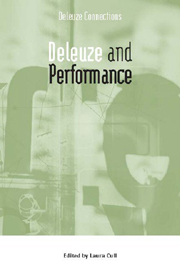Book contents
- Frontmatter
- Contents
- Introduction
- 1 Performing in the Chaosmos: Farts, Follicles, Mathematics and Delirium in Deleuze
- Act I Deleuze on Theatre: Artaud, Beckett and Carmelo Bene
- 2 I Artaud BwO: The Uses of Artaud's To have done with the judgement of god
- 3 Expression and Affect in Kleist, Beckett and Deleuze
- 4 A Theatre of Subtractive Extinction: Bene Without Deleuze
- Interval
- Act II Confronting Deleuze and Live Performance
- Interval
- Act III A Digital Deleuze: Performance and New Media
- Notes on Contributors
- Index
4 - A Theatre of Subtractive Extinction: Bene Without Deleuze
from Act I Deleuze on Theatre: Artaud, Beckett and Carmelo Bene
Published online by Cambridge University Press: 12 September 2012
- Frontmatter
- Contents
- Introduction
- 1 Performing in the Chaosmos: Farts, Follicles, Mathematics and Delirium in Deleuze
- Act I Deleuze on Theatre: Artaud, Beckett and Carmelo Bene
- 2 I Artaud BwO: The Uses of Artaud's To have done with the judgement of god
- 3 Expression and Affect in Kleist, Beckett and Deleuze
- 4 A Theatre of Subtractive Extinction: Bene Without Deleuze
- Interval
- Act II Confronting Deleuze and Live Performance
- Interval
- Act III A Digital Deleuze: Performance and New Media
- Notes on Contributors
- Index
Summary
I'd like to be Watson. … Watson doesn't understand a fuck, whenever he acts he does it at random. He is inactive even in the action that runs him. Being unable to enjoy the inorganic (it looks like it is not possible), maybe Watson is the thing that has so far been able to bewitch and enchant me. The most complete insignificance. Have you seen the vacuous faces they foist on the various Watsons, while all the other actors are always a bit hypertensive? Yes, I'd like to be Watson.
(Bene and Dotto 1998: 279–80)Sì proviamo con la vita
quotidiana e si vedrà!
Al lavoro del piacere
senza remora e decoro
il piacere del lavoro
basta qui sostituir!
(Bene 2002: 323)In the introduction to Difference and Repetition (1968), Deleuze singles out Kierkegaard and Nietzsche as two thinkers of repetition who have introduced radically innovative means of expression into philosophy by elaborating an anti-representational notion of movement. These authors invent a philosophy that directly proposes itself as a theatrical philosophy, a philosophy in the guise of theatre. For Kierkegaard and Nietzsche, it is a question of ‘producing within the [philosophical] work a movement capable of unsettling the spirit outside of all representation; it is a question of making movement itself a work, without interposition’ (Deleuze 1994: 8). Such movement should therefore be contrasted with Hegel's ‘abstract logical’ movement, a ‘false movement’, which is itself represented in that it dialectically relies on opposition and mediation.
- Type
- Chapter
- Information
- Deleuze and Performance , pp. 71 - 88Publisher: Edinburgh University PressPrint publication year: 2009



